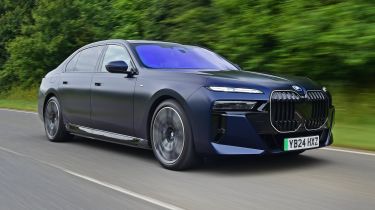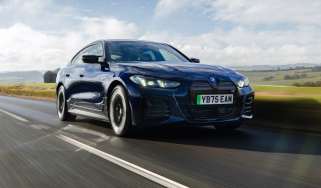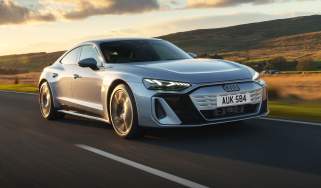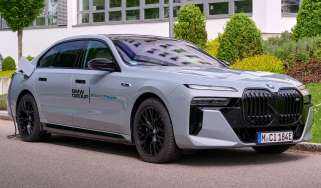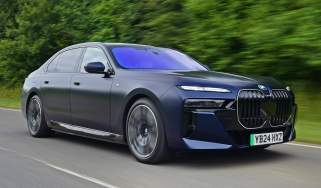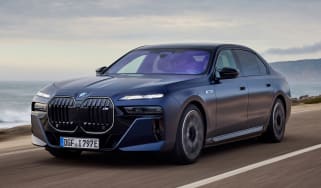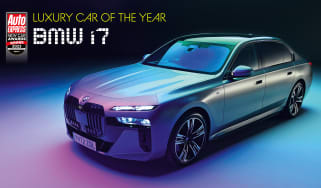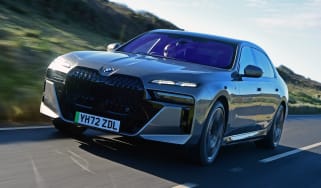BMW i7 review
The electrified 7 Series adds another dimension to the luxury driving experience

Our opinion on the BMW i7
Electrification is the perfect bedfellow for luxury motoring, and the BMW i7 proves that. At this end of the car market, weight isn’t an issue, so a big, heavy battery won’t have a significant impact on performance, but will deliver a satisfactory range, while the silent running that an electric set-up offers means that passengers are left unruffled by their surroundings. The i7 manages to add a hint of the handling prowess that BMW is noted for, but it’s more geared towards catering for back-seat occupants with a raft of tech and premium features that make it one of our favourite luxury limousines.
| Key specs | |
| Fuel type | Electric |
| Body style | Four-door saloon |
| Powertrain |
101.7kWh battery, rear-wheel drive 101.7kWh battery, four-wheel drive |
| Safety | Untested by Euro NCAP |
| Warranty | Three years/unlimited miles |
About the BMW i7
Luxury cars often foreshadow the future of motoring as a whole, and with the BMW i7 and 7 Series being sold side-by-side, they are setting a template for other models in the firm’s line-up. The seventh-generation G70 limousine arrived in the UK 2023 with just petrol-hybrid and all-electric powertrains, and since then the BMW 5 Series has followed the same template, as have the i4 and 4 Series Gran Coupe. Plus, the tech on board the i7 and 7 Series has also been finding its way into other models in the BMW line-up.
For the i7 there are three powertrains to choose from, with the rear-wheel-drive 449bhp eDrive50, the 537bhp xDrive60 with four-wheel drive, and a flagship M70 xDrive that delivers 650bhp. All of these are equipped with a large drive battery that has 101.7kWh of capacity and offers more than 350 miles of claimed range.
Used - available now

2026 BMW
I7
7,458 milesAutomaticElectric
Cash £63,650The first two powertrains come in either the comfort-orientated Excellence trim or M Sport guise, which will be familiar from other BMW models as the sporty option. On top of this, the xDrive versions of both can be upgraded to Pro specification, which essentially adds every option that’s available on the standard model for around £23,000 extra.
That sounds like a lot for an upgrade, but when you consider that the i7 range starts at more than £100,000, rising to more than £120k for the M70, that’s not really going to be an issue with potential buyers.
If you're interested in getting yourself a BMW i7, we can help. Configure your ideal BMW i7 now to get top offers from local dealers, check out the latest BMW i7 leasing deals, or search for used BMW i7 models with our Find A Car service. You can even sell your existing car for a great price with Auto Express Sell My Car.
Performance & driving experience
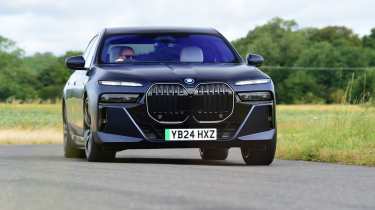
| Pros |
|
| Cons |
|
The BMW i7 has a hefty kerb weight of up to 2.8 tonnes and measures 5.4 metres long, but an optional rear-wheel-steering system helps to make it far more agile than might be expected, with a noticeable pivoting feeling in tighter turns as the back wheels move in the opposite direction to the fronts. This also drastically reduces the car’s turning circle, making for more effortless low-speed manoeuvres. At higher speeds, the rear wheels turn in tandem with the fronts to aid stability.
Despite the use of this system and a variable-ratio steering set-up, it’s easy to place the i7’s vast front end in corners. There’s very little in the way of feedback from the road surface, but that’s not really an issue in a car such as this.
As is often the case with EVs, the battery pack sits low in the car to reduce the centre of gravity, which goes some way to negating the effect of the i7’s weight. The rear-wheel-drive eDrive50 is around 120kg lighter courtesy of the removal of the front electric motor, but while it doesn’t really affect the way the car drives, it does save around £14,000 on list price.
Electric motors, 0-60mph acceleration and top speed
There’s a sporty element to the BMW i7, with even the entry-level 449bhp eDrive50 managing 0-62mph in 5.5 seconds, while the 536bhp four-wheel-drive xDrive60 manages the same sprint in 4.7 seconds. Unless you regularly drive on derestricted autobahns, the higher 149mph top speed of the xDrive60 versus the 127mph maximum speed of the eDrive50 is of little importance, making the less expensive version our preferred option.
At the top of the range is the M70 xDrive with a powerful 650bhp dual-motor, four-wheel-drive set-up that cuts the 0-62mph time down to 3.7 seconds and has an electronically limited top speed of 155mph.
As with many performance EVs, the i7 sprints away with zero fuss or even noise, although the My Modes system allows you to select different drive settings that come with sci-fi-like sounds created by film composer Hans Zimmer. These artificial noises suit the i7 remarkably well, although equally there’s something surreal about sprinting away in complete silence.
Town driving, visibility and parking
If you’re buying an i7, we’d recommend the Integral Active Steering system. It comes as standard on the M70 and with Pro versions of the xDrive60 powertrain, while it can be added to other versions as part of the Ultimate pack or as a £1,250 standalone option. The ‘active’ element is rear-wheel steering, which turns in the opposite direction to the front wheels at low speeds and means the BMW i7 has a turning circle of 12.1 metres, so manoeuvrability is improved.
This is still a long and wide car, though, so it’s best to use caution when parking. Thankfully there is a suite of safety systems to help you, with front and rear parking sensors, 360-degree cameras and even remote-control parking all offered to help you in and out of tight spots.
Instant acceleration from the electric powertrain means that the i7 is fast off the line, so there are no issues keeping pace with traffic. Energy recuperation helps with smooth braking, too, while a ‘B’ mode allows one-pedal driving, with the car coming to a halt without the driver needing to touch the brake pedal.
B-road driving and handling
The weighting of the power-assisted steering is well judged and inspires confidence on twisty roads. What’s most noticeable is the lack of body roll: the i7 stays remarkably flat through corners, although it’s hard to tell how much of this can be attributed to the twin-chamber air suspension, or the 48-volt-powered active anti-roll bars that are available as an option. Either way, the i7 is far more agile and responsive than its size might lead you to believe.
Motorway driving and long-distance comfort
At higher speeds, the rear-steer set-up changes tack and sees the back wheels move in the same direction as the fronts to boost stability and keep passengers comfortable. There’s also very little in the way of wind noise, and while 20 and 21-inch wheels are offered with wide tyres, there isn’t much road noise transmitted into the cabin, either.
| Model | Power | 0-60mph | Top speed |
| eDrive50 | 449bhp | 5.5s | 127mph |
| xDrive60 | 536bhp | 4.7s | 149mph |
| M70 xDrive | 650bhp | 3.7s | 155mph |
"BMW has a long history of building cars that are the most driver-focused in their sectors, and the i7 is a car that’s as enjoyable from the driver’s seat as it is when you’re sitting in the back. It’s not quite as nimble as the hybrid 7 Series that shares the same platform, but still impresses when you consider that even the lightest version weighs more than 2.5 tonnes." - Dean Gibson, senior test editor.
Range, charging & running costs
| Pros |
|
| Cons |
|
Low running costs are unlikely to be much of a worry for somebody buying a £100,000 limousine, but the i7 does offer significant everyday savings when compared with a 7 Series, even one that’s powered by a plug-in hybrid powertrain. That’s something that will be of more interest to luxury fleet operators, where cars such as the i7 can deliver refined, silent luxury for VIPs at a fraction of the cost of a similar combustion-engined model.
Electric range, battery life and charge time
All versions of BMW i7 feature a 105.7kWh battery with 101.7kWh of usable capacity. According to the WLTP test cycle, this provides between 340 to 387 miles of range, depending on trim specification and wheel size. We were surprised that the lighter rear-wheel-drive eDrive50 doesn’t have the best range compared with the xDrive60. That’s likely down to the car’s lower power output, which means more effort is needed to complete the WLTP test cycle. However, a loss of less than 10 miles in the official range is hardly going to matter to most buyers.
We only managed a return of 2.6 miles per kWh from the i7 when we tested it in four-wheel-drive xDrive60 form, which equates to 265 miles of range based on the usable capacity – although the situation wasn’t helped by our test being in cold weather. Judging by our previous experiences with the i7, three miles per kWh should be within reach, and that would provide a fully charged range of around 300 miles.
The maximum AC charging rate of the BMW i7 is 11 kW, while DC power can be taken on board at a rate of up to 195 kW. This allows a top up from 10-80 per cent state of charge in nearly 30 minutes from a suitably fast charger, while a typical 7.4kW home wallbox will take a little over 16 hours to fully recharge a flat battery.
| Model | Battery size | Range | Insurance group |
| eDrive50 | 101.7kWh | 379 miles | 50 |
| xDrive60 | 101.7kWh | 387 miles | 50 |
| M70 xDrive | 101.7kWh | 342 miles | 50 |
Insurance groups
With a high list price, a large battery and lots of premium kit on board, it will come as no surprise to learn that the i7 sits in the highest insurance group. However, that will be the same story for many of the car’s rivals, and the PHEV 7 Series also sits in the top group.
Tax
Since it’s an all-electric vehicle, the i7 qualifies for the lowest Benefit-in-Kind (BiK) company car tax band. For comparison, an Audi A8 diesel falls into the 37 per cent bracket. That’s a huge difference in the amount of tax payable, although of course road tax will be the same for both after the regime was updated in April 2025.
Depreciation
Residuals for luxury limousines are often fairly poor, but the i7 is a relatively strong performer. They range from 43 to 50 per cent across the range, with the eDrive50 offering the best figures, in particular when it’s in M Sport trim. In comparison, the BMW 750e and M760e plug-in hybrids are in the 43-47 per cent range, while rival electric limo the Mercedes EQS is in the 35-37 per cent range.
To get an accurate valuation on a specific model check out our free car valuation tool...
Interior, design & technology
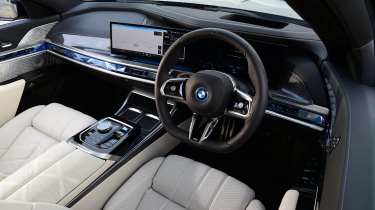
| Pros |
|
| Cons |
|
Any discussion of the BMW i7 interior has to start with the doors. The i7 has the option of automatic doors, but we’ve found their operation to be a little unreliable. Sensors on each door allow them to open to a set distance, meaning they will never open into another parked car, but if you’re standing in the way when they do operate, they won’t work. They’re easier to use from the inside, with buttons for back-seat passengers to close them, while a press on the brake pedal closes the driver’s door. There’s also a page on the main touchscreen that allows front-seat occupants to open and close each door individually, or shut all four at once.
On the inside of the back doors, there are two small smartphone-style touchpads on the doors that passengers use to operate all of the cabin functions, including climate control and seating position and massage function. While they’re easy enough to navigate, the screens could do with being a little more responsive.
Interior and dashboard design
The design of the i7’s cabin mixes art-deco touches with plenty of high-grade materials and glass-like finishes, most of which feature LED backlighting that can be changed in colour and brightness. The ‘BMW Interaction Bar’ spans the dashboard and inner door panels, and this serves three roles. Firstly, it displays fancy ambient lighting graphics based on different themes, such as ‘Efficiency’ and ‘Sport’.
Secondly, it can provide visual feedback for safety reasons (a proximity warning, for example). Thirdly, it also acts as a surface for some controls, including the front and rear window demisting buttons. Overall the layout is largely functional, with plenty of straight edges, while the dashboard features twin screens that feature the infotainment and driver’s display.
Materials and build quality
Plenty of soft leather and artificial leather is used throughout the cabin, as are gloss-black plastics where the crystal-effect material doesn’t feature. There are metal speaker grilles and solid switchgear in places, although some tactility is lost courtesy of the i7’s reliance on touchscreens.
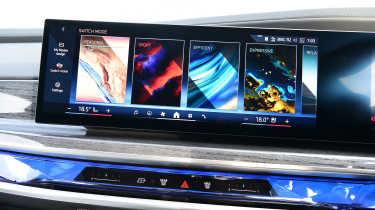
Infotainment, sat-nav and stereo
The infotainment system of the BMW i7 is dominated by the presence of the Theatre Screen, which is fitted as standard on the Excellence Pro and M Sport Pro models (and is a nearly £4,500 individual option on regular i7 trims). It’s a giant, 31.3-inch screen with 8K resolution that spans partway across the rear passenger compartment. It folds up into the car’s ceiling when not in use.
However, we were underwhelmed by the screen because there isn’t much content you can run on it that can take advantage of the width. Beyond BMW’s own demo videos, most TV series and films will have to be watched with massive black bars on either side, meaning each rear-seat passenger will need to turn their heads a fair way to see the content properly.
If you look straight ahead, the bezel of the screen unit itself is directly in your eye line. Two smaller screens may look less impressive but are far more practical, so you might be better off choosing the far cheaper option of tablet holders.
You can also upgrade to the Bowers and Wilkins Diamond Surround Sound system, which is available either in the Technology Plus pack (£5,775) or – wait for it – the near £30,000 Ultimate Pack. Also as part of this ‘everything, including the kitchen sink’ package is a hi-fi upgrade. Its sound quality is hugely impressive, giving a home cinema experience.
Otherwise, there’s every piece of modern connectivity and functionality you would expect from a premium manufacturer’s flagship model.
"As well as including the B&W sound system and automatically opening and closing doors, the Ultimate pack also includes massaging, heated and ventilated reclining rear seats. All of the functions are controlled via the touchscreen controls on the doors, and makes the i7’s cabin a relaxing place to be." - Dean Gibson, senior test editor.
Boot space & practicality
| Pros |
|
| Cons |
|
Given its intended market, the BMW i7 is large, spacious and very comfortable – and can be made all the more so with the addition of either the Rear Comfort Pack or the Executive Pack, the latter turning the i7 into something akin to a living room on wheels.
| Dimensions | |
| Length | 5,391mm |
| Width | 1,950mm |
| Height | 1,544mm |
| Number of seats | Five (in a 4+1 configuration) |
| Boot space | 500 litres |
Dimensions and size
The BMW i7 is a large car, and its squared-off shape only helps emphasise its length and width. To put it into perspective, the Mercedes EQS is 5,216mm long, 1,926mm wide and 1,512mm tall, while the BMW 5 Series measures 5,060mm long, 1,900mm wide, and 1,515mm tall.
Driving position, seats & space in the front
While the i7 is geared towards cosseting back-seat passengers, there’s still plenty of comfort up front. A wide range of wheel and seat adjustment is offered, while the driving position can be set up with a low-slung, sporty feel, or you can go taller to get a better view of your surroundings. The front passenger seat is comfortable, although the plushest features are reserved for those in the back.
Seats & space in the back
While the i7 comes with three seatbelts in the back, the middle chair is quite high and narrow to make way for the plush and adjustable outer pair, so it’s only really viable for occasional use by a child or small adult. Those outer seats offer acres of space, with lots of head and legroom for everyone, while the reclining, massage, heating and cooling functions all add to the sense of occasion you get when sitting there. You can remotely adjust the front passenger seat to give more space to the seat behind, and this can recline and extend so it’s almost like a bed. These seats also feature super-soft pillows attached to the headrests, while electric blinds rise to cover the side windows and rear windscreen, too.
Boot space
With 500 litres of boot space, the BMW i7 should be more than capable of carrying the sort of luggage required by a luxury limousine. The i7 loses some practicality points against the Mercedes EQS, because that rival not only has 610 litres of luggage capacity, but it also has a wider-opening hatchback tailgate that’ll enable it to swallow taller items compared with the restrictive saloon tailgate of the i7.
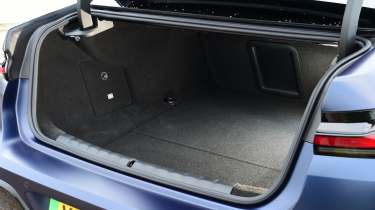
"We expect many i7s will be used as VIP transport, and BMW makes it easy to adjust the rear cabin from the driver’s seat. All of the functions that are available in the back are replicated on the main touchscreen, so a chauffeur can simply hit a few buttons to get everything reset before the next customer arrives." - Dean Gibson, senior test editor.
Reliability & safety
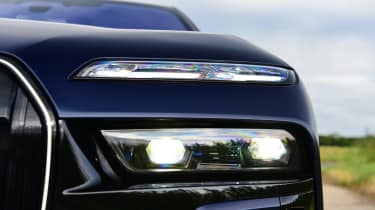
Pros |
Cons |
|
|
BMW has had a middling time in past Driver Power ownership surveys, but the 2025 poll saw the Bavarian company finish eighth in the manufacturer ranking out of 31 marques, which is one of its higher placings in recent years. However, rival Mercedes fared even better, finishing second in the 2025 survey.
BMW owners often praise their cars’ powertrains, infotainment, ride and handling, safety features, and reliability. Running costs came in for some criticism, although these should be better for the i7, especially when compared with the petrol 7 Series.
The i7 hasn’t been given a Euro NCAP rating, and neither has the 7 Series it’s based on, but with a comprehensive suite of driver-assistance and safety technology, it should be a very safe choice. If you are looking for a luxury electric car with an NCAP score, consider the Mercedes EQS, which received the maximum five-star rating in 2021.
| Key standard safety features |
|
The BMW i7 benefits from a three-year, unlimited-mileage warranty, with the battery receiving a separate eight-year or 100,000-mile warranty, whichever comes first. You’ll also get three years of roadside assistance coverage included.
Servicing for the BMW i7 is required every 24 months or 12,000 miles, whichever comes first. BMW offers an inclusive service programme, which covers a minimum of the first four years of the car’s life for an up-front contribution. In addition, servicing can be paid for by a monthly fee, which in the case of the i7 is less than £20 per month, compared with the 7 Series, which costs more than £30 per month.
Buying and owning
Our best buy: BMW i7 eDrive50 M Sport
You lose roughly 10 miles of range with the rear-wheel-drive i7, but it has a lower list price, and a range in excess of 250 miles is still enough to meet most use cases. Plus it gives you more spare change to shell out on some of the more extravagant options that are available.
BMW i7 alternatives
While the 7 Series has always been a sportier take on the luxury limousine, the i7’s extra weight means that it focuses more on comfort, making it one of our top choices in the class. Unlike BMW, Mercedes has separated its electric limousine from the S-Class and given it a bespoke EV platform to create the EQS, while it’s also offered in AMG guise. Elsewhere, there aren’t many luxury EVs, with the likes of the Audi e-tron GT, Lotus Emeya and Porsche Taycan having a sportier set-up, while the Rolls-Royce Spectre is a significantly more expensive two-door electric coupe that beats the i7 for luxury. Coming soon will be a new Range Rover Electric, while we will wait and see if the all-new Jaguar can deliver a mix of sporting luxury to match these rivals.
Deals on the BMW i7 and alternatives
BMW i7 pictures
Frequently Asked Questions
It’s a great luxury limo, which is why it (and the 7 Series PHEV) has been a past winner of our Luxury Car category in the Auto Express New Car Awards. It offers a great mix of luxury and tech, while still retaining a hint of BMW’s famous driver involvement.

